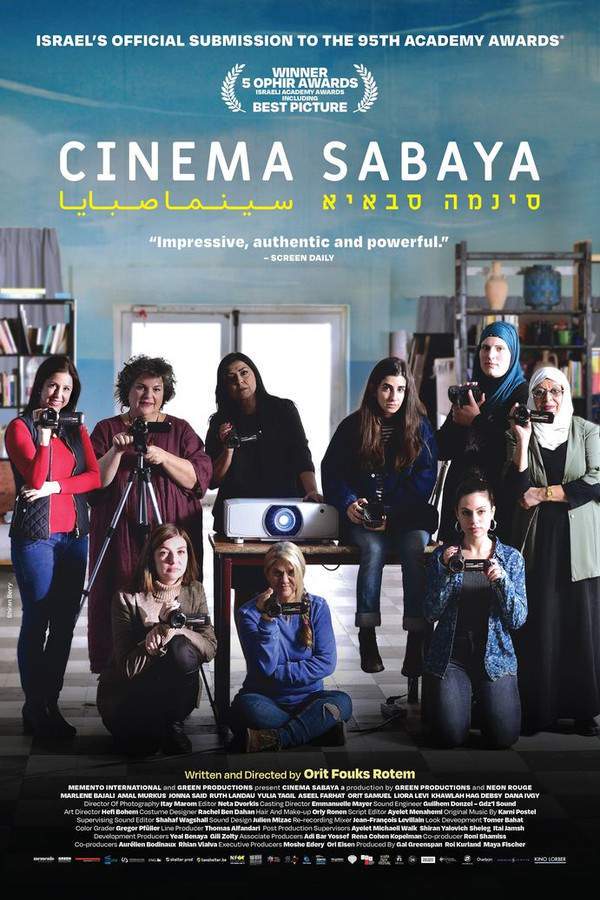Cinema Sabaya 2023

In a small town, a group of Arab and Jewish women participate in a video workshop led by a young filmmaker. As they explore their personal experiences and share intimate moments, long-held preconceptions begin to dissolve, fostering empathy and understanding. Through the creative process and a willingness to be vulnerable, these women—mothers, daughters, and wives—form a strong connection, ultimately building bridges between their cultures and communities.
Does Cinema Sabaya have end credit scenes?
No!
Cinema Sabaya does not have end credit scenes. You can leave when the credits roll.
Meet the Full Cast and Actors of Cinema Sabaya
Explore the complete cast of Cinema Sabaya, including both lead and supporting actors. Learn who plays each character, discover their past roles and achievements, and find out what makes this ensemble cast stand out in the world of film and television.
External Links and Streaming Options
Discover where to watch Cinema Sabaya online, including streaming platforms, rental options, and official sources. Compare reviews, ratings, and in-depth movie information across sites like IMDb, Wikipedia, Rotten Tomatoes or Metacritic.
Ratings and Reviews for Cinema Sabaya
See how Cinema Sabaya is rated across major platforms like IMDb, Metacritic, and TMDb. Compare audience scores and critic reviews to understand where Cinema Sabaya stands among top-rated movies in its genre.

The Movie Echo Score
Cinema Sabaya delivers a warm, socially aware portrait that resonates despite structural familiarity. Critics commend its authentic, documentary‑style direction and the emotional honesty of its ensemble, while noting the narrative sometimes follows predictable arcs. User responses highlight lasting emotional impact and relevance. The aggregate suggests a compelling, if occasionally conventional, work that rewards attentive viewing.
The Movie Echo Score Breakdown for Cinema Sabaya

Art & Craft
The direction and visual execution convey an intimate, documentary‑like realism. Reviewers point to a lightly unforced style, authentic lighting, and modest production design that ground the film. The cinematography is described as modest yet effective, avoiding didactic flourishes. These elements together produce a competent craft foundation that reinforces the film’s thematic goals.

Character & Emotion
The ensemble performances generate strong emotional resonance. Critics praise the natural chemistry of the non‑professional cast and the nuanced portrayal of diverse women's experiences. Audience feedback underscores the moving, heartfelt connections among characters. The character work stands out as a primary strength, anchoring the film’s impact.

Story & Flow
The narrative balances heartfelt moments with a familiar conflict‑resolution arc. Some critics note the story’s organic approach and optimistic tone, while others observe that the conclusions feel worn and the plot follows predictable pathways. Audience reactions reflect both engagement and occasional predictability. Storytelling is effective yet constrained by conventional structure.

Sensory Experience
The sensory design supports the film’s documentary aesthetic. Reviewers comment on subdued sound design, an understated score, and visual choices that emphasize authenticity over stylization. The intimate audiovisual palette enhances the sense of presence without overt embellishment. The sensory components coherently reinforce the film’s realistic atmosphere.

Rewatch Factor
The film offers high rewatch value due to its thematic depth and emotional sincerity. Critics and viewers alike cite its lasting relevance, the richness of personal stories, and its capacity to inspire reflection on shared humanity. Multiple mentions of lasting impact suggest it rewards repeated viewings. Its enduring appeal makes it a film that invites return engagements.

75
Metascore
tbd
User Score


86%
TOMATOMETER

99%
User Score

7.1 /10
IMDb Rating

0.00/5
Take the Ultimate Cinema Sabaya Movie Quiz
Challenge your knowledge of Cinema Sabaya with this fun and interactive movie quiz. Test yourself on key plot points, iconic characters, hidden details, and memorable moments to see how well you really know the film.
Cinema Sabaya Quiz: Test your knowledge about the acclaimed Israeli film, Cinema Sabaya.
Where does the video workshop in Cinema Sabaya take place?
A community center
A university campus
A private studio
A public library
Show hint
Full Plot Summary and Ending Explained for Cinema Sabaya
Read the complete plot summary of Cinema Sabaya, including all major events, twists, and the full ending explained in detail. Explore key characters, themes, hidden meanings, and everything you need to understand the story from beginning to end.
A diverse group of Arab and Jewish women comes together at a community center in a small town to participate in a video workshop led by Rona, a passionate young filmmaker from Tel Aviv. Through the medium of film, Rona guides these women to capture and share their personal stories, allowing them to express their experiences and emotions. As the women, including Nasrin, Nahed, Souad, Lubna, Carmela, Awatef, Eti, Gila, and Yelena, present their footage, they confront their deeply held beliefs and challenge the societal stereotypes that often divide them.
As the workshop progresses, the walls built by prejudice and misunderstanding start to crumble, and the women form a unique and powerful connection. Their shared experiences of motherhood, love, and the everyday challenges of being women in a strife-ridden world create a space of solidarity and support. The film, Cinema Sabaya, beautifully illustrates how art can serve as a bridge, fostering empathy and collaboration among individuals from disparate backgrounds.
Written and directed by Orit Fouks Rotem, who drew inspiration from her own experiences as a teacher, the film balances poignant discussions with the joy and laughter that emerge from this unlikely sisterhood. Cinema Sabaya has garnered critical acclaim, winning five Ophir Awards, including Best Picture and Best Director, and has been selected as Israel’s official submission for the 95th Academy Awards. This heartfelt narrative stands as a testament to the transforming power of creativity and community.
Uncover the Details: Timeline, Characters, Themes, and Beyond!

Coming soon on iOS and Android
The Plot Explained Mobile App
From blockbusters to hidden gems — dive into movie stories anytime, anywhere. Save your favorites, discover plots faster, and never miss a twist again.
Sign up to be the first to know when we launch. Your email stays private — always.
Discover Film Music Concerts Near You – Live Orchestras Performing Iconic Movie Soundtracks
Immerse yourself in the magic of cinema with live orchestral performances of your favorite film scores. From sweeping Hollywood blockbusters and animated classics to epic fantasy soundtracks, our curated listings connect you to upcoming film music events worldwide.
Explore concert film screenings paired with full orchestra concerts, read detailed event information, and secure your tickets for unforgettable evenings celebrating legendary composers like John Williams, Hans Zimmer, and more.



Unlock the World of Movies with Our Comprehensive Wiki
Dive into our Movie Wiki for in-depth film encyclopedia entries, including cast biographies, production trivia, plot synopses, behind-the-scenes facts, and thematic analyses. Whether you’re researching iconic directors, exploring genre histories, or discovering hidden easter eggs, our expertly curated movie database has everything you need to fuel your cinematic passion.

Quick Links: Summary, Cast, Ratings, More

What's After the Movie?
Not sure whether to stay after the credits? Find out!
Explore Our Movie Platform
New Movie Releases (2025)
Famous Movie Actors
Top Film Production Studios
Movie Plot Summaries & Endings
Major Movie Awards & Winners
Best Concert Films & Music Documentaries
Movie Collections and Curated Lists
© 2025 What's After the Movie. All rights reserved.














